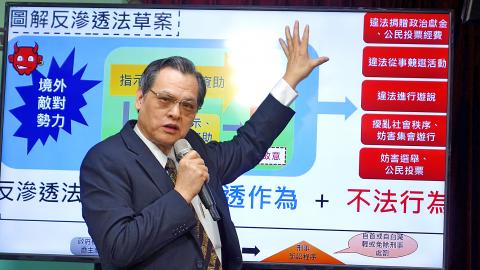The Anti-infiltration Act (反滲透法) is to take effect today, the Presidential Office said yesterday on its Web site.
The 12-article law, passed by the Legislative Yuan on Dec. 31, prohibits people acting on the instructions of or with the funding of “infiltration sources” from illegal campaigning or lobbying, or receiving illegal political donations, as well as disrupting social order, peaceful assemblies, elections or referendums.
While the activities are already defined as illegal in the Criminal Code, the Assembly and Parade Act (集會遊行法), the Presidential and Vice Presidential Election and Recall Act (總統副總統選舉罷免法) and the Civil Servants Election and Recall Act (公職人員選舉罷免法), the Anti-infiltration Act stipulates the punishments are applicable to people who break those laws on the instructions or with the financial support of infiltration sources, the Mainland Affairs Council (MAC) said.

Photo: Wang Yi-sung, Taipei Times
The Anti-infiltration Act applies only to people “who intentionally break the law, and not to those who are unaware of the situation,” the council added.
It stipulates that people who are influenced by infiltration sources and conduct illegal lobbying would be fined between NT$500,000 and NT$5 million (US$16,699 and US$166,990).
If the lobbying concerns national security issues, such as national defense, diplomacy and cross-strait affairs, the punishment would be a maximum of three years in prison or a fine of up to NT$5 million.
The Anti-infiltration Act states that for people who are influenced by infiltration sources and contravene articles 149 to 153 of the Criminal Code by disrupting social order, or Article 31 of the Assembly and Parade Act by disrupting peaceful assemblies and parades, the sentence would be increased by half of what is stipulated in the Criminal Code and the Assembly and Parade Act.
People who are influenced by infiltration sources to participate in illegal campaign activities, thus contravening the Presidential and Vice Presidential Election and Recall Act or the Civil Servants Election and Recall Act, would be sentenced to a maximum of five years in prison, or fined up to NT$10 million.
The Anti-infiltration Act states that people under the influence of infiltration sources who disrupt elections, recalls or referendums and contravene either of the two election and recall acts, would face a sentence increased by half of what is stipulated in the two acts.
A life sentence or a minimum of 15 years in prison would be given to those under the influence of infiltration sources who disrupt public gatherings such as an election or petition rally.
The Anti-infiltration Act aims to fend off infiltration, rather than curb all cross-border exchanges, the council said, adding that it would not restrict regular exchanges across the Taiwan Strait.

ACTION PLAN: Taiwan would expand procurement from the US and encourage more companies to invest in the US to deepen bilateral cooperation, Lai said The government would not impose reciprocal tariffs in retaliation against US levies, President William Lai (賴清德) said yesterday, as he announced five strategies to address the issue, including pledging to increase Taiwanese companies’ investments in the US. Lai has in the past few days met with administrative and national security officials, as well as representatives from various industries, to explore countermeasures after US President Donald Trump on Wednesday last week announced a 32 percent duty on Taiwanese imports. In a video released yesterday evening, Lai said that Taiwan would not retaliate against the US with higher tariffs and Taiwanese companies’ commitments to

Intelligence agents have recorded 510,000 instances of “controversial information” being spread online by the Chinese Communist Party (CCP) so far this year, the National Security Bureau (NSB) said in a report yesterday, as it warned of artificial intelligence (AI) being employed to generate destabilizing misinformation. The bureau submitted a written report to the Legislative Yuan in preparation for National Security Bureau Director-General Tsai Ming-yen’s (蔡明彥) appearance before the Foreign Affairs and National Defense Committee today. The CCP has been using cognitive warfare to divide Taiwanese society by commenting on controversial issues such as Taiwan Semiconductor Manufacturing Co’s (TSMC, 台積電) investments in the

‘SPECIAL CHANNEL’: Taipei’s most important tasks are to stabilize industries affected by Trump’s trade tariffs and keep negotiations with Washington open, a source said National Security Council Secretary-General Joseph Wu (吳釗燮) arrived in the US for talks with US President Donald Trump’s administration, a source familiar with the matter said on Friday. Wu was leading a delegation for a meeting known as the “special channel,” the Financial Times reported earlier. It marked Trump’s first use of the channel since returning to the White House on Jan. 20. Citing a source familiar with the matter, the Financial Times reported that Minister of Foreign Affairs Lin Chia-lung (林佳龍) was also a part of the delegation. The visit came days after China concluded war games around Taiwan and amid Trump’s

HELPING HAND: The steering committee of the National Stabilization Fund is expected to hold a meeting to discuss how and when to utilize the fund to help buffer the sell-off The TAIEX plunged 2,065.87 points, or 9.7 percent, to close at 19,232.35 yesterday, the highest single-day percentage loss on record, as investors braced for US President Donald Trump’s tariffs after an extended holiday weekend. Amid the pessimistic atmosphere, 945 listed companies led by large-cap stocks — including Taiwan Semiconductor Manufacturing Co (TSMC, 台積電), Hon Hai Precision Industry Co (鴻海精密) and Largan Precision Co (大立光) — fell by the daily maximum of 10 percent at the close, Taiwan Stock Exchange data showed. The number of listed companies ending limit-down set a new record, the exchange said. The TAIEX plunged by daily maxiumu in just